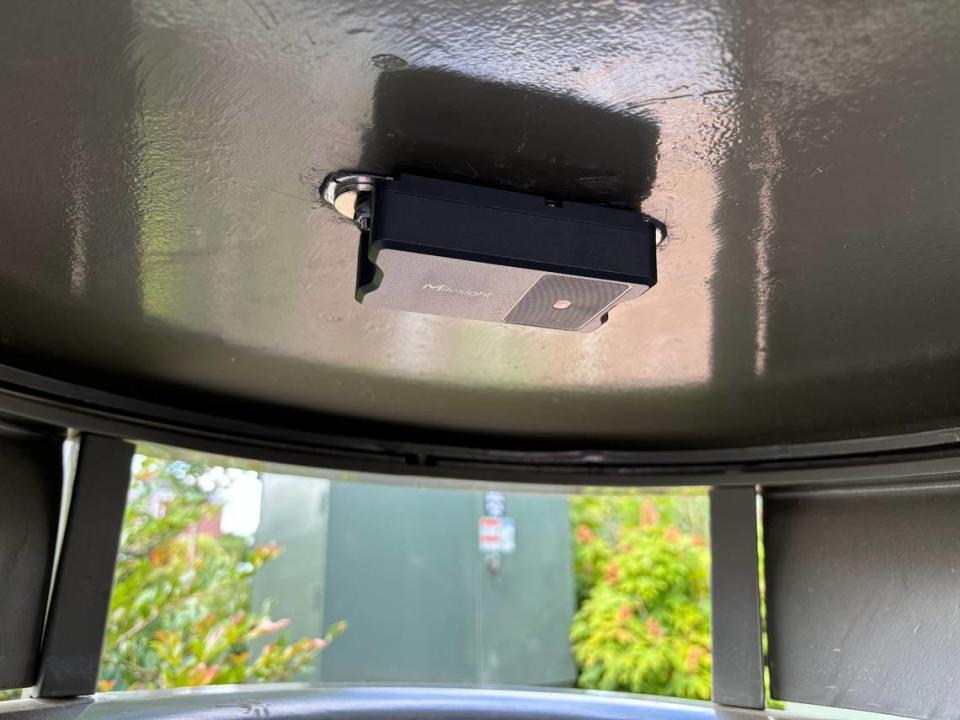Open Source: At Cary’s new downtown park, technology is in the trash, bathrooms and trees
I’m Brian Gordon, tech reporter for The News & Observer, and this is Open Source, a weekly newsletter on business, labor and technology in North Carolina.
The trash cans in the new Downtown Cary Park aren’t ordinary. Affixed to their lids, rectangular sensors measure at every moment the fullness of each bin. This data then gets transmitted through a long-range, wide-area network, known as a LoRaWAN, to a gateway where the data is stored, analyzed and eventually visualized. With this, town staff hope to gain real-time insights into when bins need to be emptied.
Same for the park’s soil sensors, which measure moisture saturation and can inform when certain areas need to be watered. And there are bathroom door sensors, which count how many people enter. Add in noise sensors, tree sensors and a temperature sensor on the park bar’s beer keg.
It’s difficult to say if Downtown Cary Park is the “smartest” park in the country, but few others have embraced a branch of technology called the Internet of Things, or IoT, to this level.
“What Cary is doing is what new parks in the future are going to be doing,” said Tom Snyder, executive director of RIoT, a Raleigh nonprofit supporting Internet of Things developments.
Downtown Cary Park opened in November after two decades of discussion. It spans seven acres and features an array of amenities: concert stage, a pond stream, slides, fountains, ping-pong tables, golf putting surface, fire pits, and a plenty of greenery. It cost roughly $68 million.
Subtly placed across these space, masked to blend into their surroundings, are the sensors. One is fitted inside the top of a kiosk and counts cell phones to gauge how many people are nearby.
“We went out on our own to solve park management problems,” Justin Sherwood, Cary’s assistant director of internet and technology, said during a tour of the park Thursday.
Cary runs its own LoRaWAN. Sherwood says this allows the town to keep costs down and control the data itself. While sensors on bathroom doors might spark privacy fears, the data Cary collects includes no personally identifiable information.

Measuring concert noise at the park ensures neighbors aren’t disturbed. And while there’s no real need for a real-time tree sensor, devices attached to trunks can capture incremental movements that warn which are most prone to tumble.
Cary’s sensor network is still in pilot mode, and the information isn’t yet superseding routines. Park employees continue to water areas during their regular rounds — not because they recognize moisture saturation has dipped below a certain percentage.
But getting tailored responses is the next goal, Sherwood said. The park is the testing grounds for what town officials envision could be a community-wide “smart” data system. The local software analytics giant SAS has partnered with Cary on the initiative. And if successful, the town’s network is strong enough to extend into neighboring municipalities like Apex, Morrisville, Durham and Raleigh.
Soon, you may never look at a public garbage can the same way. Or a bathroom.

Boom or bust
It’ll be some time before anyone knows if Boom Supersonic will be successful in North Carolina — or globally. The startup jet company envisions a future where passengers pay around $5,000 — roughly the cost of business class round-trip on international flights — to zoom through the skies in a sound barrier-breaching Boom aircraft.
The Colorado-based company hopes to board passengers in 2029. First though, it must build a plane. Boom took a necessary step towards this aim on Monday when it cut the ribbon on its first factory, a 179,000-square-foot hangar at the Greensboro’s airport.
North Carolina pitched in millions of dollars to help construct the building. Now comes the hard/exciting part. Over the next year, Boom will install testing equipment at the Greensboro site as it works to turn its demonstrator model into a finished supersonic jet called Overture.
Overture will not be like the Concorde, Boom CEO Blake Scholl says. Modern aviation technology is superior. The Overture will strategically seat fewer passengers and fly more routes. Tickets will be more affordable. And the noise… well, at least the technology is better.
American Airlines and United each agreed to purchase fleets of Overtures if and when the aircraft is ready. Both companies put nonrefundable deposits on their orders, though Boom declined to share the deposit amounts citing business confidentiality.
At the ribbon cutting Monday, Scholl said both major airlines have “skin in the game.” North Carolina does, too. Besides allocating $56.75 million in the state budget to construct two aircraft hangars at the Boom site, the state offered the company up to $87 million in future payroll tax benefits if it meets its hiring (1,761 jobs) and investment ($500 million) targets in Greensboro.
Boom may soar. It may not. We’ll see.

3-day work weeks
One North Carolina company is raising the stakes on the four-day workweek trend. Based in Franklin County, FasterLines asks its eight full-time employees to work only three days a week. Their schedule consists of 12-hour shifts, Tuesday through Thursday.
FasterLines captures real-time data (Internet of Things again!) to help fast food and car maintenance chains speed up their service lines. Zaxby’s and Take 5 are customers. Worker feedback has been positive, says founder Rob Meng.
“We’re crushing it out on those three days,” he said. “I don’t think any of our (clients) even realize we’re doing this.”
Clearing my cache
VinFast Chairman Pham Nhat Vuong told Bloomberg he’s willing to invest in his electric vehicle company “until I run out of money.” Vuong is a billionaire and Vietnam’s wealthiest person. Perhaps he’ll spend some of his fortune on the promised North Carolina factory.
An average of 350 people move to North Carolina each day, according to a new workforce report from the Economic Development Partnership of North Carolina, the state’s business recruitment organization.
Avalara, a tax compliance software provider previously based in Seattle, now lists its headquarters as Durham. The Triangle Business Journal spotted this shift on LinkedIn earlier this week. Avalara has added to its Bull City headcount in recent years, where it now employs around 500.
National Tech Happenings
More than a dozen Wells Fargo workers were fired after the company discovered they were using mouse jigglers to mask inactivity on their computers. The dismissals have put a spotlight on employee monitoring policies, a topic I discussed in 2022 with a frustrated former Nationwide Insurance worker.
What do California Gov. Gavin Newsom and Florida Gov. Ron DeSantis agree on? Restricting smartphones in schools.
The white-hot chipmaker Nvidia became the world’s most valuable company. It has a Triangle office, too.
Thanks for reading!
Enjoy Triangle tech news? Subscribe to Open Source, The News & Observer's weekly newsletter, and look for it in your inbox every Friday morning. Sign up here.

